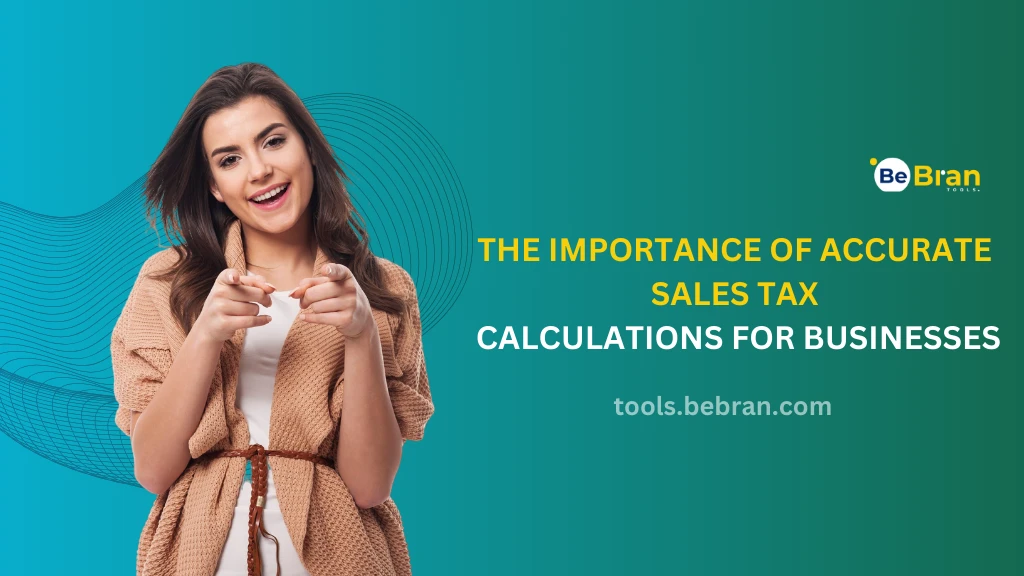
The Importance of Accurate Sales Tax Calculations for Businesses
Have you ever considered how a slight miscalculation in sales tax can impact your business? It's like navigating a boat in a stormy sea; one wrong move, and you could be thrown off course. Accurate sales tax calculations are not just a legal obligation but a cornerstone of financial health for businesses.
The importance of accurate sales tax calculations for businesses cannot be overstated. Sales tax, a levy imposed by the government on the sale of goods and services, is a critical component of the revenue systems in many countries. For businesses, managing sales tax accurately is essential for compliance, financial stability, and maintaining a positive reputation.
Understanding Sales Tax
Sales tax is a percentage of the price of goods and services that is collected by the seller and remitted to the government. The rate of sales tax varies depending on the jurisdiction and the type of product or service sold. In some regions, different types of products are taxed at different rates, while others may be exempt from sales tax altogether.
Compliance with Government Regulations
The primary importance of accurate sales tax calculations lies in compliance with government regulations. Governments require businesses to collect the correct amount of sales tax from their customers and remit it at regular intervals. Failure to comply can result in penalties, interest charges, and legal consequences. This not only affects a business’s financial health but can also damage its reputation.
Financial Accuracy and Reporting
Accurate sales tax calculations are crucial for maintaining financial accuracy. Businesses need to record the amount of sales tax they collect and pay. This information is critical for financial reporting and tax filing. Inaccuracies in sales tax calculations can lead to incorrect financial statements, affecting a company's decision-making process and potentially leading to costly adjustments in the future.
Mitigating Audit Risks
Regular audits by tax authorities are a reality for many businesses. Accurate sales tax calculations can significantly reduce the risk of audits and the associated costs. Audits can be time-consuming and disruptive to business operations. Furthermore, if inaccuracies are found, businesses may face penalties and interest charges, adding to the financial burden.
Pricing and Profit Margins
For businesses, especially in retail, pricing strategy is vital. Inaccurate sales tax calculations can affect pricing and, consequently, profit margins. Overcharging sales tax may lead to higher prices, potentially making products less competitive. Conversely, undercharging can erode profit margins.
Technological Solutions
To manage the complexities of sales tax calculations, many businesses turn to technological solutions. Sales tax software can automatically calculate the correct tax based on the product, customer location, and current tax laws. This automation reduces the risk of human error and saves time, allowing businesses to focus on core operations.
Customer Trust and Satisfaction
Customers expect businesses to charge the correct amount of sales tax. Overcharging can lead to customer dissatisfaction and damage trust, while undercharging may lead to questions about a business's credibility. Maintaining accurate sales tax calculations is essential for customer satisfaction and trust.
Adapting to Tax Law Changes
Tax laws are constantly evolving, with rates and regulations subject to change. Businesses must stay informed about these changes to ensure their sales tax calculations remain accurate. This adaptability is crucial for continued compliance and financial stability.
Global Business Considerations
For businesses operating internationally, understanding and complying with varying sales tax regulations in different countries is a significant challenge. Accurate calculations are essential to meet the tax obligations in each country and avoid legal complications.
Free Tools: Free Domain Age Checker Tool Online | Free Domain To IP Tool Online
Conclusion
In conclusion, accurate sales tax calculations are a fundamental aspect of business operations. To help in it you need a perfect sales tax calculator. They ensure compliance with tax laws, maintain financial accuracy, mitigate audit risks, influence pricing strategies, and foster customer trust. In today's ever-changing tax environment, staying informed and utilizing technological solutions is key for businesses to manage their sales tax obligations effectively. By prioritizing accurate sales tax calculations, businesses can avoid legal and financial pitfalls, contributing to their long-term success and stability.
Frequently Asked Questions
1. What are the most common mistakes in sales tax calculations?
Misapplying tax rates and neglecting to file in all relevant jurisdictions are common errors.
2. How can technology aid in sales tax compliance?
Automated tax software can help ensure accuracy and keep up with changing regulations.
3. What should I do if my business is audited for sales tax?
Consult a tax professional and ensure all your records are accurate and accessible.
4. Is it better to manage sales tax in-house or outsource it?
This depends on your business's size and complexity. Outsourcing can offer expertise and reduce errors.
5. How often do sales tax rates change?
Rates can change frequently, underscoring the need for ongoing vigilance and up-to-date systems.
6. Why is accurate sales tax calculation important for businesses?
Accurate sales tax calculation is crucial for maintaining legal compliance, avoiding penalties, and ensuring customer trust.
7. How can technology help in sales tax calculation?
Technology can automate the process, reduce errors, and keep up with changing tax laws and rates across different jurisdictions.
8. What happens if a business makes a sales tax calculation error?
Errors can lead to penalties, legal issues, and damage to the business's reputation and customer trust.



